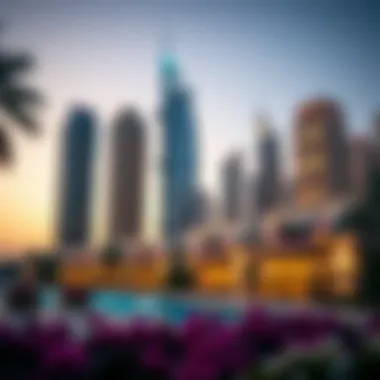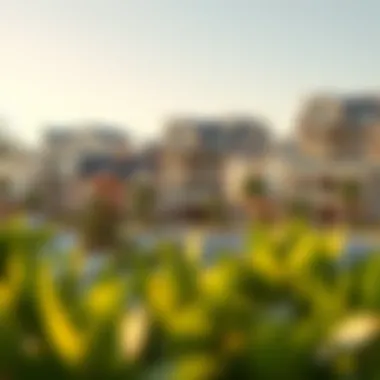The Growth of Dubai's Residential Real Estate Market


Property Market Overview
Dubai’s real estate market has seen a whirlwind of changes in recent years, shaping it into a bustling hub of residential opportunities. With the influx of buyers and investors from around the globe, understanding this dynamic market becomes essential for anyone looking to navigate its pathways.
Current Market Trends
The last few years have witnessed interesting trends in the residential sector. Demand for properties within vibrant areas such as Dubai Marina and Downtown Dubai continues to rise. The trend leans heavily toward luxury apartments and villas that boast modern architecture, ample amenities, and proximity to lifestyle attractions.
Moreover, the market has become increasingly favorable for buyers, marked by a competitive pricing environment. Developers are responding to this demand by introducing innovative residential solutions that integrate eco-friendly designs and smart technology. Residents are no longer just searching for shelter; they seek a lifestyle. Therefore, fitness centers, community spaces, and retail outlets have become almost standard expectations.
In summary, the market is vibrant, with:
- Diverse housing options: Ranging from affordable apartments to high-end villas.
- Technological advancements: Emphasis on smart home features and sustainable designs.
- Flexible payment plans: Developers offering attractive financing options to ease the burden on buyers.
Key Neighborhood Insights
Focusing on specific neighborhoods sheds light on the tapestry of Dubai’s residential offerings:
- Jumeirah Beach Residence: This iconic waterfront location is favored by expatriates and offers a blend of high-rises and beachfront living, tantalizing those who enjoy urban lifestyles near the sea.
- Arabian Ranches: For those seeking more space, this master-planned community is popular for families with its spacious villas, parks, and community centers.
- Palm Jumeirah: Known for its luxury, this unique island shape is not just about residence; it embodies a lifestyle, hosting celebrity-owned villas and high-end hotels, providing eye-catching views of the skyline.
- Dubai South: With an eye toward the future, this developing area is poised to attract numerous investors looking for emerging opportunities as the Expo 2020 site continues its impact on the local economy.
"Understanding neighborhood dynamics can greatly influence investment decisions, proving essential for both buyers and sellers alike."
Buying and Selling Guidelines
As the market evolves, knowing the steps in buying or selling properties in Dubai is paramount for any investor or potential resident.
Essential Steps for Buyers
- Research: Begin by considering the type of residence that suits your lifestyle and budget. Areas like Dubai Hills Estate or Creek Harbour might have what you need.
- Budgeting: Determine your financial capability, including maintenance and associated fees. Look beyond the purchase price to understand long-term financial impacts.
- Engage a Real Estate Agent: Collaborating with a knowledgeable agent ensures that your home buying journey is smooth. They can give you leverage in negotiations.
- Legal Aspects: Familiarize yourself with property laws in Dubai. Understanding the legal framework is vital to protect your investment.
- Making an Offer: Once you identify the right property, make a fair offer based on market analysis and property condition.
Tips for Sellers
- Property Valuation: Understanding your property’s worth is essential. Consider hiring a professional appraiser to get an objective evaluation.
- Enhancements: Small renovations or staging can significantly increase appeal for potential buyers. Better to present a property in the best light.
- Marketing: Use targeted marketing strategies to reach the right audience. Leverage social media platforms like Facebook or real estate websites to showcase your property.
- Negotiation Skills: Be prepared for negotiations. Know your minimum acceptable price and be clear on what offers you’ll entertain.
- Timing the Market: Pay attention to market conditions. The peak season often sees higher sales prices, so timing your sales can lead to better financial outcomes.
The journey through Dubai's vibrant real estate market, whether buying or selling, requires knowledge and strategy. By arming yourself with the right information, you can become adept at navigating this dynamic landscape.
Prologue to Dubai's Real Estate Landscape
Understanding the landscape of real estate in Dubai is crucial for those interested in investing or residing in this dynamic metropolis. Dubai has become synonymous with luxury and modernity, offering diverse residential options that beckon buyers and investors alike. This article will shed light on the unique features of the Dubai real estate market, making it an essential read for any stakeholders in this thriving environment.
Historical Context of Real Estate Development
Real estate development in Dubai dates back to the early 1970s, when the emirate began to shift from a modest trading port reliant on pearl diving to a flourishing city with global ambitions. The transformation was spearheaded by oil discovery, fueling rapid development and urbanization. With vast wealth, Dubai’s leaders implemented strategic plans to create a financial hub, hence inviting international investments.
Over the decades, landmark projects such as the Burj Khalifa and Palm Jumeirah have placed Dubai on the world map, showcasing its dedication to innovative architecture and luxurious living. These ambitious undertakings laid a solid foundation for the current real estate market, shaping what’s available today. The influx of expatriates and foreign nationals seeking residency further accelerated the growth of the market.
Current Trends in Residential Properties
As we step into the present, the trends in residential properties reflect a mix of traditional luxury and modern practicality. Dubai's real estate sector is marked by a noticeable shift towards sustainability and smart living. Investors are increasingly leaning toward eco-friendly developments that promise reduced environmental impact without sacrificing comfort and luxury.
In addition, the rise of affordable housing options is redefining who can live within this metropolitan jewel. Previously considered a playground for the affluent, many new projects aim to cater to middle-income residents, leading to a more inclusive housing market.
Notably, here are some current trends in the residential landscape:
- Smart Homes: Increased integration of technology within properties, making residence management easier.
- Gated Communities: A surge in demand for private, secure living space.
- Mixed-Use Developments: Combining residential areas with commercial spaces for a holistic living experience.
"The real estate market in Dubai is not just about luxurious towers; it’s evolving to meet the diverse needs of a growing population."
By recognizing these trends, investors can better navigate opportunities within a market that continues to evolve, promising potential for favorable returns on investment. With its unique blend of history and modernity, Dubai’s real estate sector stands as a testament to what can be achieved when innovation meets ambition.
Types of Residential Properties
The residential property market in Dubai is as diverse as its culture. Each type of residence offers unique benefits and considerations that cater to different lifestyles and investment goals. Understanding the various types of residential properties is paramount for potential investors and buyers, as this knowledge helps them make an informed decision aligned with their preferences and financial strategies. From luxury villas that exude opulence to high-rise apartments boasting stunning views, each category presents distinct opportunities and challenges that are crucial to grasp before diving into the market.


Luxury Villas and Estates
Luxury villas and estates are often the crown jewels of Dubai's property landscape. Known for their expansive spaces, bespoke designs, and high-quality finishes, these residences typically cater to affluent buyers looking for exclusivity and comfort. Located in exclusive neighborhoods, such as Jumeirah Beach Residence or Palm Jumeirah, these homes often come with luxury amenities like private pools, landscaped gardens, and direct beach access.
Investing in a luxury villa can lead to significant returns, particularly in areas that are highly sought after. This segment attracts not only local buyers but also foreign investors looking for second homes or vacation properties. However, it's essential for potential buyers to be aware of the ongoing costs, including maintenance and homeowner association fees, which should be factored into their overall investment strategy.
Apartments and High-Rise Towers
The skyline of Dubai is punctuated with striking high-rise towers that house luxurious apartments. These properties are designed with modern living in mind, often featuring state-of-the-art facilities such as gyms, swimming pools, and communal lounges. High-rise living offers a unique opportunity for both investors and tenants, as they provide stunning city views and proximity to business hubs and entertainment venues.
For buyers, investing in an apartment can be a strong choice due to lower entry costs compared to villas, alongside potential for high rental yields. According to recent market trends, apartments in iconic buildings, such as the Burj Khalifa or Dubai Marina, have shown resilience in value appreciation. However, location remains a vital consideration; properties near transport links and commercial areas often attract tenants quickly, ensuring consistent rental income.
Townhouses and Gated Communities
Townhouses and gated communities in Dubai offer a different kind of charm, appealing to families and those seeking a community atmosphere. These properties typically combine the space of a villa with the affordability of an apartment. Gated communities often provide additional security, shared amenities, and a sense of belonging. Popular areas like Arabian Ranches and Mira have become coveted for their family-friendly environments and access to schools and parks.
Investors may find that townhouses can appeal to a diverse group, from young families to down-sizers. The steady demand for these communities creates a stable rental market as many expatriates look for comfortable living environments. One crucial factor to remember, however, is the potential for homeowners association fees, which can impact monthly expenses.
"In the diverse fabric of Dubai's real estate, understanding the types of residential properties is essential for anyone looking to invest or find a home. Each type brings its distinct flavor and considerations to the table."
In summary, the types of residential properties in Dubai reflect the city's multifaceted real estate landscape. Whether it’s the luxury of villas, the conveniences of apartments, or the community feel of townhouses, each category provides opportunities for both living and investing. Navigating these options wisely can yield fruitful outcomes in Dubai's ever-evolving market.
Key Drivers of Demand in Dubai's Residential Market
Understanding the key drivers of demand in Dubai's residential market is crucial for anyone looking to navigate this evolving landscape. Various factors come into play that shape both property values and consumer preferences in this dynamic setting. Knowing these elements can greatly influence investment decisions, property management, and even buying choices for prospective residents. All in all, comprehending these factors is not just beneficial but essential for understanding the future trajectory of the market.
Economic Factors Influencing Property Values
The economy of Dubai is often regarded as one of the most vibrant in the United Arab Emirates. There are several economic indicators to consider. For one, the tourism sector has been a significant contributor to the local economy. The influx of tourists creates a demand for short-term rental properties, particularly in areas like Downtown Dubai or Dubai Marina, where tourists flock for entertainment and leisure.
Moreover, the recent fiscal policies established by the government, aiming to stimulate economic growth, have also led to a robust real estate market. Initiatives like reduced property registration fees and increased foreign ownership have all played a role in enticing both local and international buyers.
In essence, a lively economic setting boosts consumer confidence, and this, in turn, impacts property values positively. Investors who are aware of these economic trends can potentially seize lucrative opportunities in a fluctuating market.
Demographic Trends and Population Growth
Dubai's population growth presents yet another dimension to consider. The city has seen a significant rise in its expatriate community, with people coming from various parts of the globe for work and lifestyle choices. Evidence shows that the population has steadily increased, supported by ongoing development projects and job opportunities.
This demographic shift brings about changing needs and desires among prospective buyers and renters. Families often seek spacious residences near schools, while young professionals prefer sleek apartments with modern amenities close to business hubs.
The current trend indicates a growing preference for integrated communities that offer not just housing but also lifestyle facilities. High-rise apartments, for example, often come with gyms, pools, and other leisure spots, making them appealing to a younger crowd. Thus, understanding these demographic inclinations can prove invaluable for targeting marketing strategies and property development.
Global Investment and Expatriate Communities
Dubai stands at the crossroads of Europe, Asia, and Africa, making it a global hub for investment, particularly in real estate. The city has attracted international buyers and investors due to its favorable tax structures and relatively stable political climate. High net worth individuals often view property in Dubai as a solid investment, driven by the city's expansion and continuous development.
Furthermore, the expatriate communities, often comprising professionals from different sectors, fuel demand for residential properties. They bring diverse outlooks and needs, thus fostering a rich tapestry of housing options in the market. Investors should recognize that catering to the demands of this expatriate demographic offers significant opportunities.
In summary, the key drivers impacting the residential market in Dubai highlight the interplay between economic factors, shifting demographics, and global investments. Recognizing and leveraging these drivers allows for smarter decision-making in the fast-paced real estate sector.
Innovations in Residential Development
Innovations in residential development are pivotal in shaping the future of Dubai’s real estate market. The rapid transformation of this sector, underpinned by new technologies and sustainable practices, is not merely a trend but a necessary evolution responding to global demands for efficient and eco-friendly living. With Dubai aiming to position itself as a global hub, the incorporation of innovative housing solutions is critical for attracting buyers and investors who seek not just luxury, but also functionality and sustainability.
Sustainable and Smart Housing Solutions
Sustainable housing goes beyond looking good on paper; it embodies a fundamental approach to conservation and resource management. In the context of Dubai, where heat and water scarcity pose significant challenges, smart and sustainable housing solutions address these issues head-on. Here are several key elements that define this aspect:
- Energy Efficiency: Many new developments are being designed to minimize their carbon footprint. This includes advanced insulation techniques, energy-efficient windows, and the use of solar panels. Such features not only reduce the environmental impact but also lower utility costs for residents.
- Water Conservation Technologies: Innovative systems are being put in place to recycle wastewater for irrigation and utilize low-flow fixtures inside homes. These technologies align with the UAE's broader goals of managing water resources more effectively.
- Sustainable Materials: Developers are increasingly opting for materials that are sustainable and locally sourced. This not only reduces transportation costs but supports the local economy.
Additionally, the integration of green spaces in residential communities enhances the living environment, promoting residents' well-being and creating a more appealing residential locale.
"Sustainable living isn't just a choice; in places like Dubai, it’s becoming a necessity for the future of urban planning."
Integration of Modern Technology


Modern technology shapes the way we live and interact with spaces we inhabit. In Dubai’s residential sector, technological advancements contribute not only to convenience but also to heightened security and energy management. Key aspects include:
- Smart Home Automation: Many developments now offer automation systems that control lighting, heating, and security systems via smartphones. This convenience attracts tech-savvy buyers who prefer being in control of their living environment at their fingertips.
- Building Information Modeling (BIM): This technology allows architects and developers to visualize a building’s lifecycle, leading to better planning and resource management. With BIM, potential issues can be identified early, ensuring projects are completed efficiently.
- Virtual Reality (VR) and Augmented Reality (AR): These tools are increasingly used in property viewings and marketing, allowing prospective buyers to experience their potential new home interactively, even before construction is completed.
By leveraging modern technology, Dubai’s real estate developments are not only keeping pace with global standards but also setting new ones. Investors and potential homeowners now look towards these technologically advanced living spaces as an embodiment of luxury and modernity woven into the very fabric of their daily lives.
In summary, while the structural aesthetics of residences in Dubai are visually impressive, it's the underlying innovations in sustainable and technological domains that will ultimately define the trajectory of this market. As both developers and buyers become more discerning, these innovations will emerge as not just desirable, but essential components of future residential developments.
Impact of Regulations on Residential Property Market
The impact of regulations on the residential property market in Dubai cannot be overstated. This aspect structures the framework within which all real estate transactions occur, influencing both the investors' confidence and the buyers' willingness to engage in the market. Regulations can either act as a catalyst for growth or create bottlenecks that hinder development. Thus, establishing a clear understanding of these regulations is crucial for anyone contemplating a stake in Dubai’s vibrant real estate scene.
To comprehend the landscape fully, it’s essential to scrutinize two key components: government policies and incentives, alongside the legal framework governing property ownership. Together, these factors shape the investment climate, encouraging or deterring real estate ventures.
Government Policies and Incentives
When we talk about government policies, we're diving deep into the regulations that the Dubai government has set forth to promote investment and ensure market stability. This includes everything from the introduction of tax incentives to favorable loan conditions for property buyers. For instance, the introduction of a 100% foreign ownership policy in specific sectors greatly attracts international investors.
Consider the Real Estate Regulatory Agency (RERA), which plays an active role in overseeing real estate transactions. They ensure transparency, impose strict compliance standards, and protect buyers from potential fraud. Policies, such as the establishment of mortgage caps, further guard against over-leveraging by investors, contributing to a healthier market overall.
Just as importantly, development zones present a wealth of incentives, such as reduced fees and the potential for longer lease periods, which entice investors to develop residential projects. The benefits offered can range from streamlined approvals for new projects to provisions supporting sustainability.
- Key government incentives include:
- Zero property tax for 15 years in specific zones.
- Government-backed financing for first-time buyers, easing the financial burden.
- Land-use regulations designed to streamline the development process.
Legal Framework Governing Property Ownership
Understanding the legal framework governing property ownership in Dubai is akin to tackling an onion—layer after layer reveals more complexity. Different types of ownership exist, notably freehold and leasehold, each with its own set of rights and obligations. Familiarizing oneself with these definitions is essential to comprehend what owning property in Dubai entails.
Freehold ownership allows international buyers to purchase property outright, providing a sense of security and long-term investment. Conversely, leasehold ownership, typically for 99 years, may not be as appealing due to the fact that the land ultimately reverts to the original owner after the lease term.
Investors must also navigate through various legalities concerning property registration, inheritance laws, and dispute resolution mechanisms. The creation of the Dubai Land Department is one such initiative to ensure clear land titles and streamline property registration. Additionally, laws surrounding property management have seen numerous revisions to enhance efficiency and protect tenant rights.
"Regulation acts as the bedrock of Dubai’s real estate market, fostering a more transparent and robust investment environment."
Overall, regulations are a double-edged sword—they can provide reassurance yet may carry certain restrictions as well. Thus, savvy investors should continuously monitor legislative changes, as adapting to this dynamic environment directly correlates with long-term success and profitability in Dubai's bustling property market.
For more detailed insights on the topic, refer to the following resources:
Market Analysis and Investment Strategies
Market analysis and investment strategies stand as essential pillars for anyone looking to engage with Dubai's residential real estate market. Understanding these elements can mean the difference between a profitable venture and financial missteps. These strategies encompass nuances that are crucial for investors, buyers, agents, developers, and sellers, who aim to navigate this ever-evolving landscape with clarity and confidence.
Assessing Property Value Trends
When analyzing the property market in Dubai, tracking value trends provides clarity about potential investment gains. It’s essential to note that Dubai's real estate landscape isn't static. Factors like changing demographics, economic fluctuations, and government policies can significantly affect property values.
In order to assess trends effectively:
- Look at historical data: Research trends over the past years. How have different property types fared?
- Monitor upcoming developments: New infrastructural projects and community plans can impact nearby property values significantly.
- Evaluate buyer sentiment: Attend open houses and exhibitions to gauge what buyers are leaning toward.
Real estate analysts might suggest contrasting neighborhoods or emerging hotspots that promise increased valuation. A keen eye on property trends reveals both risks and opportunities.
Evaluating Rental Yields and Capital Gains
Understanding the interplay between rental yields and capital appreciation is vital for investors in Dubai. Rental yields often attract investors, encouraging them to consider properties as profitable, passive income sources. In many areas of Dubai, yields can be strikingly advantageous when compared to global city averages.
To evaluate:
- Rental income vs. Property cost: Calculate the potential annual rental income alongside the purchasing cost.
- Local demand trends: High demand can lead to both increased rental prices and enhanced capital gains. Areas close to schools, shopping centers, or public transportation tend to perform better.
- Regulatory impacts: Keep an eye on regulations that could affect rental prices, such as tenant laws, which might change the risk dynamics.


Generally, the goal here is to balance both immediate cash flow from rentals against long-term capital gains which can amplify total returns.
Risk Assessment and Mitigation Techniques
Every investment carries its risks, particularly in dynamic markets like Dubai's real estate scene. Potential fluctuations in market conditions, such as new laws or economic downturns, can affect investments. However, employing sound risk assessment and mitigation strategies can safeguard investments.
To navigate risks effectively:
- Diversify Investments: Don’t put all your eggs in one basket. Invest in various property types or locations to spread risk.
- Conduct robust due diligence: Investigate the legal status of properties, the reputation of developers, and current market conditions.
- Utilize market forecasts: Stay updated with reputable industry analyses and trends. Resources such as Dubai Land Department provide comprehensive insights into property trends.
- Consider professional consultation: Expert advice from real estate consultants can offer tailored strategies that align with specific investment goals.
"Prior planning prevents poor performance." The proverbial wisdom rings true in real estate ventures.
Using these strategies deftly, investors can navigate the complexities of Dubai's market, making informed decisions that align with both their short and long-term financial goals.
As an investor or buyer approaches this bustling market, a solid grasp of these strategies not only enhances the potential for success but ensures resilience amidst market changes.
The Future of Residences in Dubai
The trajectory of Dubai's residential market is often akin to the speed of its skies, forever launching upwards. Understanding the future of residences in this vibrant city is not just about looking ahead; it's about recognizing the myriad of possibilities this landscape presents for investors and residents alike. The city's ability to adapt and evolve in response to shifting preferences and global trends makes it a focal point for real estate enthusiasts.
One of the defining characteristics of the future residential development in Dubai is its commitment to sustainability and innovation. As awareness about environmental issues grows, new developments are not only designed for aesthetic appeal but also for energy efficiency and environmental responsibility. Properties are increasingly incorporating green technologies such as solar panels, rainwater harvesting, and smart home systems. Buyers now prefer homes that are not just luxurious but also sustainable, creating a market that values ecological footprints alongside the opulence.
In addition, the evolution of neighborhoods in Dubai reflects the need for community integration. It's becoming common to see residential projects that seamlessly blend living, working, and leisure spaces. The idea is to develop environments where residents can enjoy a holistic lifestyle, minimizing the necessity for long commutes, which in turn reflects the global trend toward enhancing quality of life. In short, how and where people choose to live is evolving based on their values and needs.
Emerging Neighborhoods and Development Projects
Back in the golden days, Dubai was largely associated with towering skyscrapers and high-end shopping malls. Today, it’s about more than those dazzling features. Emerging neighborhoods are gaining traction, providing diverse residences that cater to various demographics.
Communities like Dubai Creek Harbour and Dubai Marina offer more than just homes; they create a lifestyle.
Key Features of Notable Projects or Neighborhoods include:
- Dubai Creek Harbour: Positioned as the city's new waterfront district, focuses on sustainable urban design and aims to house a variety of residential options from luxurious apartments to affordable housing.
- Dubai Hills Estate: Distinctly crafted for families, offering parks, schools, and shopping centers within walkable distances.
- Jumeirah Village Circle: Known for its budget-friendly villas and townhouses, appealing to a more diverse buyer's market.
These emerging neighborhoods cater not just to the luxury market but also acknowledge the needs of families, young professionals, and expatriates searching for affordable yet quality living. The varied architectural styles and community concepts enable a unique living experience that reflects the multicultural essence of Dubai.
Emerging developments indicate a paradigm shift towards creating well-rounded neighborhoods. This will not only solidify Dubai as a prime destination for residents of all backgrounds but also enhance its appeal in the global real estate market.
Long-Term Projections for the Market
When it comes to forecasting the future of Dubai's real estate market, opinions may vary, but certain trends are beginning to carve out a clearer picture. The property sector is expected to continue its trajectory of growth, underpinned by sustained demand from both local and international buyers.
Factors Influencing Long-Term Projections:
- Continued Influx of Expatriates: Dubai’s allure as a global hub isn’t waning; more expatriates are expected to relocate, further driving demand for residences.
- Infrastructure Development: Ongoing infrastructure projects, like the expansion of the metro and the upcoming Expo 2025, promise to make Dubai more accessible and attractive.
- Technological Integration: The rise of smart homes, with integrated technologies improving security and convenience, is anticipated to redefine residential living.
Importantly, market stability and transparency will become even more critical for investors looking at long-term engagements. Regulatory frameworks will continue to evolve, which is a positive sign for fostering a reliable investment environment.
Investing in Dubai's residential market means engaging in a dynamic and developing space. As such, understanding these evolving dynamics will be crucial for both short-term and long-term success.
In sum, the future of residences in Dubai is intertwined with innovation, sustainability, and a commitment to community living. This next chapter will likely require potential buyers and investors to keep their ear to the ground and stay informed as the market continues to develop.
Closure: Navigating the Residential Market
In the intricate web of Dubai's real estate market, understanding how to navigate residential opportunities is essential for both investors and buyers. The importance of this topic cannot be overstated. Dubai's continuously evolving landscape makes it a fascinating yet challenging environment for those looking to make a substantial investment or find a place to call home. By analyzing the key points presented throughout this article, we can distill vital insights that guide stakeholders as they interact in this dynamic field.
Summary of Insights for Investors and Buyers
Dubai's residential market is fueled by an array of factors, from economic trends to current demographic shifts. Investors spotlight several core elements:
- Diverse Property Types: The market offers an impressive variety of options, including luxury villas, high-rise apartments, and quaint townhouses. This variety presents ample opportunities depending on the target demographic or investment strategy.
- Government Support: Proactive policies favoring foreign investment bolster compliance and encourage growth. Understanding these regulations can enhance decision-making.
- Technological Integration: Modern housing solutions now often encompass smart technology, which not only enhances living standards but also boosts property desirability.
Moreover, understanding the neighborhood's social fabric can significantly influence property choice. Each residential area in Dubai presents unique characteristics, from offers of community living to bustling high-street experiences.
Recommendations for Future Engagement
For individuals or organizations looking to dive into Dubai's residential market, several considerations arise:
- Conduct Thorough Research: Stay updated on trends and neighborhood developments. Resources like Dubai Land Department provide valuable insights into market status.
- Engage Local Experts: Real estate agents and legal advisors with a solid grasp of the market can provide tailored guidance, helping buyers avoid potential pitfalls.
- Networking: Join real estate forums or attend property expos for direct interaction with other investors, developers, and even potential tenants. Platforms like Reddit can help you find discussions relevant to the property market.
- Consider Exponential Growth Areas: Focus on emerging neighborhoods that may yield higher returns as Dubai develops further infrastructure.
By weaving together insights from this exploration, both investors and buyers can navigate the residential market more astutely, ensuring their interactions yield both satisfaction and financial viability. The pulse of Dubai's real estate is often found within the unique stories of its neighborhoods, where each residence holds promise for future memories and investment stability.











